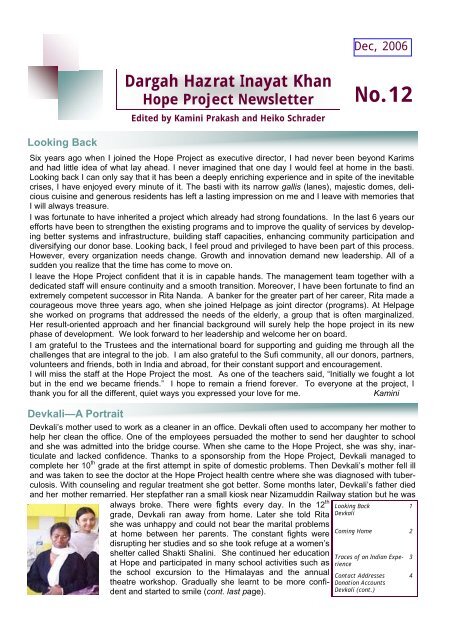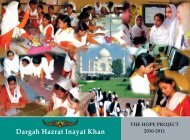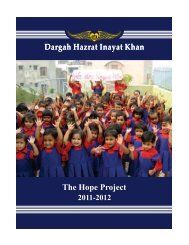Dargah Hazrat Inayat Khan Hope Project Newsletter
Dargah Hazrat Inayat Khan Hope Project Newsletter
Dargah Hazrat Inayat Khan Hope Project Newsletter
Create successful ePaper yourself
Turn your PDF publications into a flip-book with our unique Google optimized e-Paper software.
Looking Back<br />
<strong>Dargah</strong> <strong>Hazrat</strong> <strong>Inayat</strong> <strong>Khan</strong><br />
<strong>Hope</strong> <strong>Project</strong> <strong>Newsletter</strong><br />
Edited by Kamini Prakash and Heiko Schrader<br />
Dec, 2006<br />
Devkali’s mother used to work as a cleaner in an office. Devkali often used to accompany her mother to<br />
help her clean the office. One of the employees persuaded the mother to send her daughter to school<br />
and she was admitted into the bridge course. When she came to the <strong>Hope</strong> <strong>Project</strong>, she was shy, inarticulate<br />
and lacked confidence. Thanks to a sponsorship from the <strong>Hope</strong> <strong>Project</strong>, Devkali managed to<br />
complete her 10 th grade at the first attempt in spite of domestic problems. Then Devkali’s mother fell ill<br />
and was taken to see the doctor at the <strong>Hope</strong> <strong>Project</strong> health centre where she was diagnosed with tuberculosis.<br />
With counseling and regular treatment she got better. Some months later, Devkali’s father died<br />
and her mother remarried. Her stepfather ran a small kiosk near Nizamuddin Railway station but he was<br />
always broke. There were fights every day. In the 12 th<br />
grade, Devkali ran away from home. Later she told Rita<br />
she was unhappy and could not bear the marital problems<br />
at home between her parents. The constant fights were<br />
disrupting her studies and so she took refuge at a women’s<br />
shelter called Shakti Shalini. She continued her education<br />
at <strong>Hope</strong> and participated in many school activities such as<br />
the school excursion to the Himalayas and the annual<br />
theatre workshop. Gradually she learnt to be more confident<br />
and started to smile (cont. last page).<br />
Looking Back<br />
Devkali<br />
No.12<br />
Six years ago when I joined the <strong>Hope</strong> <strong>Project</strong> as executive director, I had never been beyond Karims<br />
and had little idea of what lay ahead. I never imagined that one day I would feel at home in the basti.<br />
Looking back I can only say that it has been a deeply enriching experience and in spite of the inevitable<br />
crises, I have enjoyed every minute of it. The basti with its narrow gallis (lanes), majestic domes, delicious<br />
cuisine and generous residents has left a lasting impression on me and I leave with memories that<br />
I will always treasure.<br />
I was fortunate to have inherited a project which already had strong foundations. In the last 6 years our<br />
efforts have been to strengthen the existing programs and to improve the quality of services by developing<br />
better systems and infrastructure, building staff capacities, enhancing community participation and<br />
diversifying our donor base. Looking back, I feel proud and privileged to have been part of this process.<br />
However, every organization needs change. Growth and innovation demand new leadership. All of a<br />
sudden you realize that the time has come to move on.<br />
I leave the <strong>Hope</strong> <strong>Project</strong> confident that it is in capable hands. The management team together with a<br />
dedicated staff will ensure continuity and a smooth transition. Moreover, I have been fortunate to find an<br />
extremely competent successor in Rita Nanda. A banker for the greater part of her career, Rita made a<br />
courageous move three years ago, when she joined Helpage as joint director (programs). At Helpage<br />
she worked on programs that addressed the needs of the elderly, a group that is often marginalized.<br />
Her result-oriented approach and her financial background will surely help the hope project in its new<br />
phase of development. We look forward to her leadership and welcome her on board.<br />
I am grateful to the Trustees and the international board for supporting and guiding me through all the<br />
challenges that are integral to the job. I am also grateful to the Sufi community, all our donors, partners,<br />
volunteers and friends, both in India and abroad, for their constant support and encouragement.<br />
I will miss the staff at the <strong>Hope</strong> <strong>Project</strong> the most. As one of the teachers said, “Initially we fought a lot<br />
but in the end we became friends.” I hope to remain a friend forever. To everyone at the project, I<br />
thank you for all the different, quiet ways you expressed your love for me. Kamini<br />
Devkali—A Portrait<br />
Coming Home 2<br />
Traces of an Indian Experience<br />
Contact Addresses<br />
Donation Accounts<br />
Devkali (cont.)<br />
1<br />
3<br />
4
Coming Home<br />
„Well, I´m sure volunteering in India is a good thing but don’t expect to change the world. You<br />
would only end up getting disappointed“<br />
I was told this before going to India and I knew I shouldn’t have any illusions about how useful I<br />
was going to be. Seriously, what can a European teenager do to fight poverty and oppression far<br />
away from home?<br />
When I was a small boy I had lived in Delhi. I knew what I was going to be confronted with. But<br />
I didn´t expect to change much.<br />
In August 2005, after finally getting my visa, I went to India for a year of social service. The welcome<br />
at the project was friendly. In spite of my poor Hindi, I didn´t end up being unemployed. I<br />
was given many different tasks: a bit of administration, a bit of teaching, a bit of remedial<br />
classes, charity-fairs and finally even a charity -“marathon“<br />
When I went home for my Christmas vacations, I<br />
looked back at an incredibly intensive, interesting but<br />
also exhausting time and I was glad I could take a<br />
break.<br />
The impressions and images of my stay are still vivid<br />
and I have been trying ever since to put them down in<br />
to words without much success: How would you describe<br />
the ambience in the basti during the month of<br />
Ramadan, when Muslims fast sitting in front of delicious<br />
food? Or the mood on Diwali, the Hindu festival<br />
of lights, when I was invited to several family-pujas?<br />
Or the feeling when you escape a cruel terrorist attack<br />
in the nick of time? Or, even the feeling of powerlessness against so much injustice in our<br />
world? The break was needed and did me good.<br />
But then, on my way back from Delhi airport to my flat, I was overwhelmed by a completely unexpected<br />
feeling: The feeling of coming home. I was really looking forward to the coming seven<br />
months. By now I had developed a good rapport with everyone at the project, especially the students.<br />
In the first few months we were all students together: we attended primary classes, sat<br />
together, studying Hindi, and writing dictations. Whenever there was some time left, we practiced<br />
saying „Guten Morgen“. Having just graduated from school myself and still learning, I<br />
gradually became what I continued to be throughout my stay: Max bhaiya (brother Max) - a confidante<br />
and friend.<br />
Steadily my Hindi improved and I became more useful. I started teaching English, translated the<br />
teachers’ monthly reports from Hindi to English, worked in the Crèche, the Nursery-classes and<br />
in the end also in the evening school. I had become part of the project and this was a great feeling.<br />
To quote from my farewell speech:<br />
„In the beginning I was always happy when there were other foreign volunteers in the project.<br />
They brought a piece of home along. But over the year this changed dramatically. I found that in<br />
the presence of foreigners, I suddenly was one of them again and not part of the project, whereas<br />
when I was the only „stranger“ I didn´t feel like a stranger at all and wasn´t treated as one<br />
either. It felt like home here and for this amazing feeling I want to thank you all!“<br />
It´s not easy to live in Delhi and it takes some time to get used to it. It´s not easy to see so much<br />
wealth and poverty existing side by side. In general it´s not easy to face poverty and misery.<br />
How you manage to deal with it, finally depends on you! But the realization that you are working<br />
in an organisation that has only one aim – helping the poor - makes it much easier to look in every<br />
ones eyes again.<br />
I went to India, knowing that I would not change the world and I´m glad I went.<br />
(Maximilian von Laer (19) volunteered at the <strong>Hope</strong> <strong>Project</strong> from September 2005 to July 2006.)<br />
No. 12<br />
Page 2
Traces of an Indian Experience<br />
Germany is strange … where are all the people? The streets are so quiet, almost scary. And<br />
why is my fiancée nagging me about crossing the road like a kamikaze? How else can you reach<br />
the other side?<br />
My seven weeks in India changed me more than I had realized. Many people who go to India to<br />
work in a development project want to serve and bring about a change. However India often<br />
ends up changing them. Even more so, if you are working in Nizamuddin for the <strong>Hope</strong> <strong>Project</strong>.<br />
I was responsible for photographing the activities of the <strong>Hope</strong> <strong>Project</strong> and was fortunate to get an<br />
opportunity to experience different aspects of the project and the spirit that holds it together.<br />
Just a few impressions of the city and Nizamuddin:<br />
Delhi is a megacity, with more than ten times the population of Munich, congested, overcrowded,<br />
terrible traffic, noise, pollution and obtrusive people. It is impossible to survive here without patience<br />
and the ability to accept the moment for what it offers.<br />
But Nizamuddin is different. Cars cannot penetrate the maze of narrow alleys and still the basti<br />
pulsates with life. It is amazing, how fast I felt a part of this complex social fabric, although there<br />
were no foreigners to be found – or may be that’s why.<br />
When I arrived in Delhi and saw people clad in turbans and saris, I was overwhelmed by a feeling<br />
of the “Exotic”. Two weeks later in Nizamuddin, I experienced the same feeling when I saw a<br />
European visiting the shrine of a Sufi saint, with a handkerchief covering his head. It is fascinating<br />
how contact with a different culture can change ones’ perspective. This was possible because<br />
I lived and worked at the <strong>Hope</strong> <strong>Project</strong>. These experiences make a longer lasting impression<br />
than visiting tourist attractions in a foreign country.<br />
There were many exceptional facets to the <strong>Hope</strong><br />
<strong>Project</strong> but what struck me the most were the outspoken,<br />
curious and happy children. The difference<br />
was especially striking in the case of the girls in Nizamuddin<br />
who are normally extremely shy and reserved.<br />
At the <strong>Project</strong> however, the girls would<br />
smile at me and even bombard me with a volley of<br />
curious questions – in spite of the language barriers<br />
that existed between us.<br />
The scene in the classroom is even more animated.<br />
The students can barely contain their curiosity and<br />
are brimming with questions and ideas. Most German<br />
teachers would be delighted to have such<br />
committed, confident and inquisitive students. The pedagogy in the school is extremely successful<br />
and has impacted the daily behavior of the students.<br />
If one really values the ideas of the students and motivates them to think and question, one can<br />
work wonders even in a conservative neighborhood that has limited opportunities for women. Interestingly,<br />
even my own bias against veiled women changed. After all, every one of those veils<br />
could be hiding a confident and curious <strong>Hope</strong> student!<br />
It is funny, but even now I feel that “I belong” and I am looking forward to introducing my fiancée<br />
to my Indian family. Even though I am fast settling back into a German routine, I know that India<br />
and the <strong>Hope</strong> <strong>Project</strong> have left their indelible mark on me.<br />
Simon Eickhoff was a volunteer at the <strong>Hope</strong> <strong>Project</strong>. Visit http://simoninindia.blogspot.com<br />
for more information on the curriculum, visit http://curriculumathope.blogspot.com<br />
No. 12<br />
School girls in science lab<br />
Page 3
Contact addresses:<br />
DARGAH HAZRAT INAYAT KHAN HOPE PROJECT<br />
Initiated by Pir Vilayat <strong>Khan</strong> in 1975<br />
- United States: Anna Less, email: annaless99@gmail.com; donations: Maharaji, email: masti@taconic.net<br />
- Germany: Heiko Schrader, ph.: +49(0)521-8949919, email: heiko.schrader@gse-w.uni-magdeburg.de<br />
- Netherlands: Khabir Matthes, ph. +31(0)570 532347, email: matthes@tref.nl<br />
- Other Europe: Martin Zahir Roehrs, ph: +33(0)147284846, email: hope@zenithinstitute.com<br />
- India: Carmen Hussain, ph.: +91 (11) 915-72510; email: chussain@eth.net<br />
- <strong>Hazrat</strong> <strong>Inayat</strong> <strong>Khan</strong> <strong>Dargah</strong> <strong>Hope</strong> <strong>Project</strong>: email: hopeproject@vsnl.com<br />
Pir Zia <strong>Inayat</strong> <strong>Khan</strong>, Richard Glantz, Martin Zahir Roehrs<br />
Anna and David Shahabuddin Less, Carmen Hussain, Abrar <strong>Khan</strong><br />
Gert Johan Manschot, QuanYin Lynne Williams, Heiko Schrader<br />
Donation accounts Please send your donation to one of the following accounts. Do not forget your name and address!<br />
Devkali (cont.)<br />
h t t p : / / w w w . s u f i o r d e r . o r g /<br />
http://www.hope-project.de/<br />
http://www.hopeprojectindia.org<br />
Country Recipient Account No. [Bank Code] Note<br />
United States Please send checks made out to<br />
<strong>Hope</strong> <strong>Project</strong> Charitable Trust, P.O.Box 657,<br />
New Lebanon, NY 12125<br />
United Kingdom<br />
Send checks to Sufi Order International, 23<br />
rue de la Tuilerie, F-92150 Suresnes, or<br />
transfer to account Sufi Order Intl.<br />
40150703 [20-96-55]<br />
Barcley’s Bank PLC, Branch Willesden<br />
Germany Lebenshilfe Indien 271 1044 500 [47690080]<br />
Volksbank Detmold-Lage<br />
Switzerland Zenith Institute<br />
<strong>Hope</strong> <strong>Project</strong><br />
International Board members<br />
10062.02 [80350]<br />
Banca Raiffeisen Olivone<br />
Austria Indienhilfe 03220137570 [14000], BAWAG<br />
Netherlands Stichting <strong>Hazrat</strong> <strong>Inayat</strong> <strong>Khan</strong> <strong>Dargah</strong> <strong>Hope</strong><br />
<strong>Project</strong><br />
21.24.84.001, Triodos Bank<br />
France OSIF Enfants Indie 000 3726 1837 67 [4060]<br />
India <strong>Hope</strong> <strong>Project</strong> Charitable Trust 522-1-008993-4, Standard Chartered<br />
Bank, Narayan Manzil 23 Barakhamba Rd.,<br />
New Delhi 110001<br />
Donation to<br />
<strong>Hope</strong> <strong>Project</strong><br />
Donation to<br />
<strong>Hope</strong> <strong>Project</strong><br />
After graduating from the 12 th grade, she returned home. She had a new determination and seemed<br />
confident about her future. She applied to Vidyasagar Institute of Mental Health (VIMHANS) for a 6<br />
month in-house training course in looking after the elderly. <strong>Hope</strong> <strong>Project</strong> paid Rs. 400 per month for the<br />
6 month training. After that she started earning Rs. 2000 during the practical training. Our support<br />
stopped then. Today she is earning Rs. 5000 a month and is even saving money.<br />
The VIMHANS coordinator, Ripin, is full of praise for Devkali. She is sincere and hardworking and he<br />
hopes more girls from the basti join the course.<br />
Devkali still continues to drop into the <strong>Hope</strong> <strong>Project</strong> every now and then. A bright smile lights up her<br />
face. We asked Devkali, how this transformation happened?<br />
“You need to act – just thinking about it will never get you anywhere.”<br />
Devkali will continue to work but also plans to do her graduation through a correspondence course.




